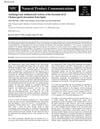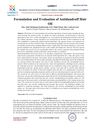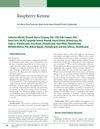4 citations,
October 2018 in “Skin appendage disorders” Co-washing is gentler on hair but can cause residue buildup.
Modern shampoos use a mix of surfactants and other ingredients to clean, reduce irritation, and improve performance.
34 citations,
January 2022 in “Molecules/Molecules online/Molecules annual” Natural ingredients in cosmeceuticals are beneficial for skin and hair health with few side effects.
 5 citations,
May 2022 in “Fashion and Textiles”
5 citations,
May 2022 in “Fashion and Textiles” Hair conditioners with argan oil or camellia oil improve the strength and color of bleached hair.
 9 citations,
October 2012 in “Natural Product Communications”
9 citations,
October 2012 in “Natural Product Communications” The essential oil from Chamaecyparis lawsoniana has strong antibacterial and antifungal effects, especially against yeast and Gram-positive bacteria.
 January 2025 in “International Journal of Advanced Research in Science Communication and Technology”
January 2025 in “International Journal of Advanced Research in Science Communication and Technology” The herbal hair oil effectively promotes hair growth, reduces dandruff, and is safe for all hair types.
 38 citations,
June 2005 in “Contact Dermatitis”
38 citations,
June 2005 in “Contact Dermatitis” Patient had scalp allergy from minoxidil; test helped identify cause and suggest alternative treatments.
 30 citations,
December 2014 in “Toxicological Research”
30 citations,
December 2014 in “Toxicological Research” Peppermint oil can effectively promote hair growth without being toxic.
 8 citations,
October 2020 in “Pharmaceutics”
8 citations,
October 2020 in “Pharmaceutics” Dutasteride-loaded nanoparticles coated with Lauric Acid-Chitosan show promise for treating hair loss due to their controlled release, low toxicity, and potential to stimulate hair growth.
 7 citations,
January 2007 in “Elsevier eBooks”
7 citations,
January 2007 in “Elsevier eBooks” Shampoos clean hair mainly with surfactants and have added ingredients for extra benefits.
 1 citations,
December 2021 in “International journal of research in dermatology”
1 citations,
December 2021 in “International journal of research in dermatology” Dermatologists should learn more about shampoos to better treat hair and scalp issues.
 1 citations,
August 2020 in “Food Research”
1 citations,
August 2020 in “Food Research” Plant extracts like Avicennia marina, Boehmeria nipononivea, and Camellia sinensis could potentially treat hair loss with fewer side effects than synthetic drugs.
 1 citations,
December 2019 in “International journal of innovative technology and exploring engineering”
1 citations,
December 2019 in “International journal of innovative technology and exploring engineering” Fish scale-based organic hair oil and shampoo may improve hair health and prevent damage.
 1 citations,
May 2019 in “British journal of health care management/British journal of healthcare management”
1 citations,
May 2019 in “British journal of health care management/British journal of healthcare management” Choose cost-effective emollients for dry skin conditions and prescribe appropriate amounts.
 December 2023 in “International Journal For Multidisciplinary Research”
December 2023 in “International Journal For Multidisciplinary Research” Indian medicinal plants can help with hair growth and common hair issues.
 30 citations,
February 2018 in “Journal of Pharmacy and Pharmacology”
30 citations,
February 2018 in “Journal of Pharmacy and Pharmacology” Hedychium spicatum has medicinal properties but needs more research for scientific validation and use.
 25 citations,
May 2021 in “Journal of exposure science & environmental epidemiology/Journal of exposure science and environmental epidemiology”
25 citations,
May 2021 in “Journal of exposure science & environmental epidemiology/Journal of exposure science and environmental epidemiology” Common Black hair care products may affect hormone levels and potentially impact health, especially in reproductive and metabolic areas.
 23 citations,
March 2019 in “Journal of Essential Oil Research”
23 citations,
March 2019 in “Journal of Essential Oil Research” Rosemary's antioxidant content changes with the climate and season.
 23 citations,
January 2001 in “International journal of toxicology”
23 citations,
January 2001 in “International journal of toxicology” St. John's Wort extract and oil safety in cosmetics is unclear; more data needed on photosensitization, toxicity, and human irritation.
 22 citations,
July 2017 in “BMC complementary and alternative medicine”
22 citations,
July 2017 in “BMC complementary and alternative medicine” Natural remedies for hair and scalp issues are still widely used in Palestine.
 21 citations,
July 1988 in “Clinics in dermatology”
21 citations,
July 1988 in “Clinics in dermatology” Good haircare and communication with doctors are key for managing hair loss.
 18 citations,
October 2013 in “EFSA Journal”
18 citations,
October 2013 in “EFSA Journal” Coriander seed oil is safe for healthy adults at up to 600 mg per day.
 17 citations,
April 2015 in “Tropical Journal of Pharmaceutical Research”
17 citations,
April 2015 in “Tropical Journal of Pharmaceutical Research” Asiasari Radix et Rhizoma is safe and has potential for new drug development due to its therapeutic properties.
 12 citations,
February 2014 in “Recent Patents on Inflammation & Allergy Drug Discovery”
12 citations,
February 2014 in “Recent Patents on Inflammation & Allergy Drug Discovery” Shampoos have evolved into multifunctional products with patented innovations for different hair needs and can include medicinal herbs for hair and scalp health.
 9 citations,
January 2010
9 citations,
January 2010 The herbal hair dye is a safe and eco-friendly alternative to conventional dyes.
 6 citations,
April 2013 in “Alternative and Complementary Therapies”
6 citations,
April 2013 in “Alternative and Complementary Therapies” Raspberry ketone lacks sufficient human research to support health benefit claims and requires more rigorous studies to confirm its safety and effectiveness.
 5 citations,
January 2017 in “Elsevier eBooks”
5 citations,
January 2017 in “Elsevier eBooks” The document concludes that cosmetics need biocompatible, eco-friendly ingredients due to aging populations and demand for effective products.
 January 2024 in “Journal of Pharmacognosy and Phytochemistry”
January 2024 in “Journal of Pharmacognosy and Phytochemistry” Rosemary hair serum promotes healthier, stronger, and shinier hair.
 January 2020 in “Journal of Pharmacognosy and Phytochemistry”
January 2020 in “Journal of Pharmacognosy and Phytochemistry” The VCO-based herbal hair tonic is effective, safe for hair loss treatment, and can be mass-produced.
 January 2002 in “Journal of Toxicology-cutaneous and Ocular Toxicology”
January 2002 in “Journal of Toxicology-cutaneous and Ocular Toxicology” Botanical extracts are increasingly important in cosmetics and drugs for their effectiveness and safety, backed by traditional use and scientific evidence.


























